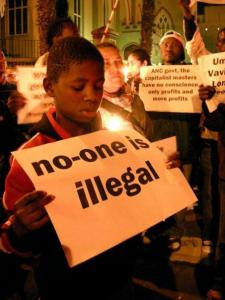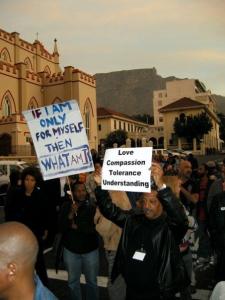Written by Ellen Rosenberg; Photos by Nicky Newman

As most of you have undoubtedly heard, violent attacks, primarily on African refugees living in South African townships, have made international news in the past few months. While CHOSA is not a news agency, we felt it necessary to address this issue to our growing family across the world. It is intrinsic to understand that the mood and actions of the few should not be perceived as that of the whole. While I don’t hold South African citizenship, I feel very much a part of the society in which I spent the last three years. On a personal level, I am shocked, disappointed, angry and ashamed of the actions of my “fellow” South Africans. On May 21, Abahlali baseMjondolo, a Durban-based shack-dweller’s movement, posted a message to all on their website, “An action can be illegal. A person cannot be illegal. A person is a person where ever they may find themselves.” (Abahlali baseMjondolo)
News coverage has highlighted the brutal and inhumane treatment of Mozambicans, Congolese, Burundians, Malawians, Zimbabweans, Somalis and refugees from many other countries living in the shanty towns throughout South Africa. However, the painful truth is that the attacks were not isolated to these groups. Attacks on groups of fellow South Africans, such as Pedis and Shaangans, have been reported on many local news websites. By May 28, CNN reported that more than 56 had been killed and 50,000 people had been displaced as a direct result of the recent attacks. Today’s casualties are reported to be much higher than this.
The Mail and Guardian, a widely distributed news-source in South Africa, argues that “Although the ferocity and scale of these attacks are new, the sensibilities driving them are familiar and somewhat vintage”. In fact, foreigners living in South Africa have routinely been victimized by their South African counterparts and, even more frightening, are systematically unable to access the protection and services they require from the state. I can only imagine what it would be like to flee your home country in search of safety, only to find yourself and your family under attack once you’ve settled in another place.
The reasoning behind the anger and brutality of the attacks has been explained to be coming from the frustration of South African citizens at the slow (and sometimes absent) delivery of basic services including electricity, toilets,

housing, running water and trash removal. While there is absolutely no excuse or rationale to condone the climate of hostility, nonetheless, it is important to understand the complaints and explanations.
We, as members of the CHOSA community, must continue to support the citizens who are peacefully advocating and working to better their own circumstances. Abahlali discusses many of the preconceived notions about foreigners, detailing and refuting accusations one-by-one. “People also say that people born in other countries are willing to work for very little money bringing everyone’s wages down. But we know that people are desperate and struggling to survive everywhere. Fight for strong unions that cover all sectors, even informal work. Don’t turn your suffering neighbors into enemies.” (Abahlali baseMjondolo) It is a detriment to all to promote a culture of exclusivity and hatred of our neighbors. Let us hope for progress and promotion of a culture of inclusion, cooperation and mutual understanding.
If you have comments or questions, please join CHOSA’s online community where we can engage in discussions on this and other topics pertinent to CHOSA’s work in South Africa.
Recent Posts
Archives
- August 2017
- June 2017
- May 2017
- April 2017
- March 2017
- November 2016
- September 2016
- July 2016
- June 2016
- May 2016
- March 2016
- February 2016
- July 2015
- May 2015
- March 2015
- December 2014
- September 2014
- July 2014
- June 2014
- January 2014
- December 2013
- November 2013
- July 2013
- June 2013
- May 2013
- March 2013
- February 2013
- December 2012
- November 2012
- October 2012
- September 2012
- July 2012
- June 2012
- April 2012
- March 2012
- February 2012
- December 2011
- October 2011
- September 2011
- August 2011
- July 2011
- June 2011
- May 2011
- March 2011
- January 2011
- December 2010
- November 2010
- April 2010
- March 2010
- December 2009
- November 2009
- September 2009
- June 2009
- May 2009
- April 2009
- March 2009
- July 2008



Recent Comments